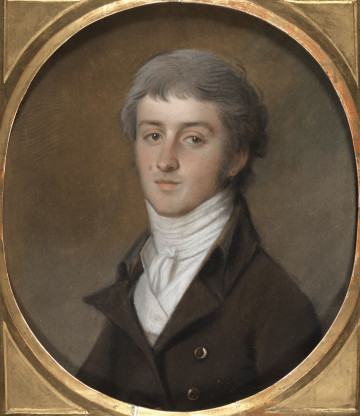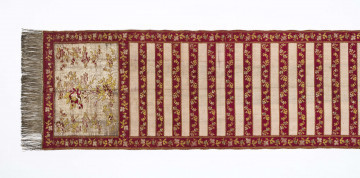The dress
ca 1941
Museum of the history of Polish Jews
Leon and Grunia (after the war: Grania) Klitenik lived in Telechany (now Belarus), where they were both originally from. His wife was born in 1911, the same year as Leon Klitenik, whose Jewish name was Lejb (the surname Klitenik most probably derives from the name of a village 140 km west of Telechan - Kletnoe). They had a son Józef born in January 1940. The Klitenik's daughter, Helena Klitenik-Primik, born after the war (the story told below is based on information from the donor), supposes that the parents fled with the child to the East not so much because of their Jewish roots, but mainly because of Leon Klitenik's political activities. He was a communist, and it was expected - in the family this view was expressed above all by Leon's father - that the Germans would arrest communists first. Leon Klitenik actually went back to get his family, but his father again refused to flee. The entire family of Leon and Grana Klitenik, who remained in Telechany, later perished during the mass murder of the Jewish population in August 1941. One of the few surviving members of the family was Leon's older brother, Efroim Klitenik (Franciszek after the war), who also fled, with his wife, to the East.
The episode of Leon Klitenik's return to Telechan had dramatic consequences. Someone took the one-and-a-half-year-old Józef from his mother's arms and handed him over to a group of people heading east in a car. Leon later managed to catch up with the car by bicycle and recover the child. He reached Gomel, where he decided to wait for his wife. He enlisted in the Red Army, and for the duration of his military duties he placed the child in a 24-hour nursery.
Grunia Klitenik had no contact with her husband after that separation (for many years, until 1944). When she arrived in Gomel, she found neither him nor the child in the city. She only found out that the child was not with her husband. The nursery had been evacuated. She started an intensive correspondence search for the child, among others through the Red Cross organisation. Unsuccessful. The Kliteniks never again managed to come across a trace of the child.Grunia Klitenik found herself in eastern Volga, first working at the kolkhoz and, from the autumn onwards, at a cooperative in Krasny Kuta: she had been a seamstress since the age of 17, and was employed at a sewing workshop (named after the German communist Ernest Thelman).
When autumn came, she sewed herself a warm woollen dress from the leftovers of her military chinos. It is in the collection of the Polin Museum, donated as a keepsake by Helena Klitenik-Primik.
The collection also contains a photo for Gruna Klitenik's documents, which she sent to her husband when they found each other by correspondence.
Leon Klitenik died in May 1996, his wife two months after him.
Przemysław Kaniecki

1934
National Museum in Szczecin

19th (?) century
Castle Museum in Łańcut

1766 — 1788
National Museum in Lublin
DISCOVER this TOPIC
Castle Museum in Łańcut
DISCOVER this PATH
Educational path